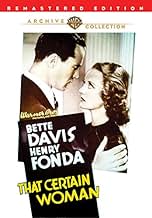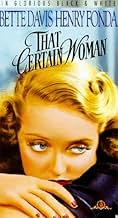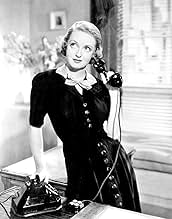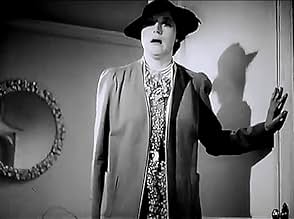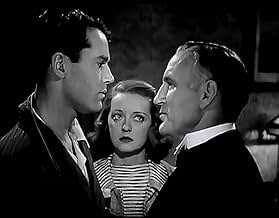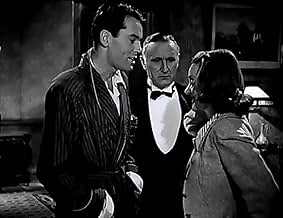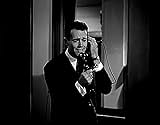NOTE IMDb
6,4/10
1,8 k
MA NOTE
Ajouter une intrigue dans votre langueMary Donnell, a young legal secretary with a past, elopes with a client's son, but his father has the marriage annulled without knowing she's pregnant.Mary Donnell, a young legal secretary with a past, elopes with a client's son, but his father has the marriage annulled without knowing she's pregnant.Mary Donnell, a young legal secretary with a past, elopes with a client's son, but his father has the marriage annulled without knowing she's pregnant.
- Réalisation
- Scénario
- Casting principal
- Récompenses
- 1 victoire au total
Katharine Alexander
- Mrs. Rogers
- (as Katherine Alexander)
Mary Philips
- Amy
- (as Mary Phillips)
Richard DeNeut
- Boy
- (as Dickie DeNeut)
John Hamilton
- American
- (scènes coupées)
Edward Keane
- Opposing Counsel
- (scènes coupées)
Avis à la une
Bette Davis is "That Certain Woman" in this 1937 remake of "The Trespasser." Davis is the widow of a mobster killed in the Saint Valentine's Day massacre. Now she works for a businessman Lloyd Rogers (Ian Hunter) and uses the name Mary Donnell. She has two men in love with her: her boss Lloyd and a man from a wealthy family, Jack Merrick (Henry Fonda). Knowing who she is thanks to a news story, Merrick's dad (Donald Crisp) is violently opposed to the marriage, but she and Jack marry. They break up right after the honeymoon, thanks to the dad, but during the honeymoon, Mary conceived Jack Jr. Jack goes off to Paris and marries Flip (Anita Louise), not knowing anything about the baby. Meanwhile, the unhappily married Lloyd is hanging around Mary.
Very melodramatic and dated film in the Stella Davis sacrifice vein, with both Davis and Fonda giving excellent performances. Fonda in those days was Jane Fonda with a man's haircut - the resemblance is there for all to see. He's adorable. Also as an actor, he was more energetic and earnest; later, he became more internalized, and in my opinion, less interesting. Davis sports an ugly hair-do (except when she's either just waking up or going to bed).
Very likable stars, and the story will keep you interested, even if it is dated.
Very melodramatic and dated film in the Stella Davis sacrifice vein, with both Davis and Fonda giving excellent performances. Fonda in those days was Jane Fonda with a man's haircut - the resemblance is there for all to see. He's adorable. Also as an actor, he was more energetic and earnest; later, he became more internalized, and in my opinion, less interesting. Davis sports an ugly hair-do (except when she's either just waking up or going to bed).
Very likable stars, and the story will keep you interested, even if it is dated.
Audiences will groan at the character of Mary Donnell. Bette Davis is normally looking out for number one--and she's definitely her good old self in the first half of the movie. The widow of a gangster, Donnell has become a super-competent legal secretary for a respected attorney in a big firm. She fends off unwanted press attention and generally handles herself quite well as a tough single girl in the big city.
She becomes the mistress of her married boss at the law firm (although the Hays Office undoubtedly required the removal of any breath of sexual content here, it should be pretty obvious to all what is going on). In the second half of the movie, which focusses on Jack Merrick (Henry Fonda), whom Donnell has always loved, she achieves peaks of self-sacrifice that will send you staggering to the bathroom to throw up.
This is the sort of film that gives soap opera a bad name.
She becomes the mistress of her married boss at the law firm (although the Hays Office undoubtedly required the removal of any breath of sexual content here, it should be pretty obvious to all what is going on). In the second half of the movie, which focusses on Jack Merrick (Henry Fonda), whom Donnell has always loved, she achieves peaks of self-sacrifice that will send you staggering to the bathroom to throw up.
This is the sort of film that gives soap opera a bad name.
Was actually expecting quite a lot from 'That Certain Woman'. Yes it did sound very melodramatic, but there was a good deal of talent involved. Bette Davis gave many great performances, the best of which legendary status, as did Donald Crisp, who did a lot of big supporting roles in a varying filmography (but nearly always one of the better things about the not so good films). Henry Fonda was no stranger to good performances either and Edmund Goulding's other collaborations with Davis ranged from above average to great.
Not so sadly with 'That Certain Woman', which is perhaps their weakest collaboration. Through no fault of Davis, who is actually the best thing about it, there are other good things and it started off promisingly. All of that is unfortunately undermined by the film falling apart in the second half, where the amount of soap suds that lingers even after the film is over leaves a bitter aftertaste and the character writing certainly should have much more balanced and less simplistic.
Davis is as said the best thing about 'That Certain Woman' and is quite wonderful. A wide range of emotions very powerfully conveyed, even when the film falls apart. It is such a shock seeing Crisp play such an unpleasant character, he plays him very well and menacingly without overacting. The other female characters are sympathetically portrayed, especially Anita Louise.
'That Certain Woman' is lovingly made, with a real sense of mood in the photography and the production values overall have a lot of class. Max Steiner's score is sumptuous and swells and sweeps in distinctive fashion. Goulding directs tastefully in the first half, which is quite charming and affecting.
All that is undone in the second half, where the melodrama gets excessively heavy, the sentimentality makes for at two trips to the bathroom to try and wash out the soap suds welling up in the mouth and things do get silly to the point of ridiculousness. The amount of self-sacrifices Mary makes is so much that it becomes nauseating. The ending somehow rings false and is especially mawkish. The script gets increasingly stilted and soapy, and the momentum in the pace really goes.
Fonda looks uncomfortable in a role that really does not suit him, got the sense too that he himself knew that. Ian Hunter has too little to work with and doesn't have an awful lot of presence, at least he fares better than Fonda. Did have a problem with how the characters are written, especially the male ones, where too few of the characters have much dimension and are either written as too perfect or too cruel.
On the whole, watchable but with a lot that doesn't work. 5/10
Not so sadly with 'That Certain Woman', which is perhaps their weakest collaboration. Through no fault of Davis, who is actually the best thing about it, there are other good things and it started off promisingly. All of that is unfortunately undermined by the film falling apart in the second half, where the amount of soap suds that lingers even after the film is over leaves a bitter aftertaste and the character writing certainly should have much more balanced and less simplistic.
Davis is as said the best thing about 'That Certain Woman' and is quite wonderful. A wide range of emotions very powerfully conveyed, even when the film falls apart. It is such a shock seeing Crisp play such an unpleasant character, he plays him very well and menacingly without overacting. The other female characters are sympathetically portrayed, especially Anita Louise.
'That Certain Woman' is lovingly made, with a real sense of mood in the photography and the production values overall have a lot of class. Max Steiner's score is sumptuous and swells and sweeps in distinctive fashion. Goulding directs tastefully in the first half, which is quite charming and affecting.
All that is undone in the second half, where the melodrama gets excessively heavy, the sentimentality makes for at two trips to the bathroom to try and wash out the soap suds welling up in the mouth and things do get silly to the point of ridiculousness. The amount of self-sacrifices Mary makes is so much that it becomes nauseating. The ending somehow rings false and is especially mawkish. The script gets increasingly stilted and soapy, and the momentum in the pace really goes.
Fonda looks uncomfortable in a role that really does not suit him, got the sense too that he himself knew that. Ian Hunter has too little to work with and doesn't have an awful lot of presence, at least he fares better than Fonda. Did have a problem with how the characters are written, especially the male ones, where too few of the characters have much dimension and are either written as too perfect or too cruel.
On the whole, watchable but with a lot that doesn't work. 5/10
Yes, it's a ridiculous, confusing plot. Yes, the characterizations are clichéd archetypes. The portrayal of her son shows a child yanked around with what we would see today as neglect, or even cruelty. But David fully commits, and elevates the entire enterprise. She is showcased, and provides a subtlety and range of emotion far beyond the script, e.g., she makes her interaction with the child actor believable. Fonda hangs in there, but his character doesn't give him much to work with. And some scenes rise to her level -- especially the conversation with Anita Louise in her wheelchair. We see the characters reacting to one another in an unlikely and awkward plot contrivance, and simultaneously see two skilled actresses working together to make all this believable and even moving. Plus, the wheelchair action is ... remarkable. Davis looks great, beautifully photographed, well-lit, with the famous eyes showcased repeatedly, to great effect. The finale has to be seen to be believed. What the involved viewer expected - and dreaded - is suddenly revealed to have taken place, and the effect is -- hilarious relief. Certainly not a great film, but essential for those who appreciate and admire Davis.
In spite of it's impressive leads and the usually sure handed direction of Edmund Goulding That Certain Kind of Women is a lumbering, mawkish an implausible melodrama. Disjointed at times you get the feeling a reels missing.
Where do we begin. Ex-moll Mary Donnell is trying to go straight as an executive secretary for Lloyd Rogers who though married has a thing for Mary. Mary though falls for Jack Merrrick Jr. (Henry Fonda) much to the chagrin of Jack Sr. (Donald Crisp) who gets sonny's marriage annulled by playing hardball with her past. The two part he remarries and she has his kid. Years pass, Rogers dies and leaves her a ton of cash. Junior comes back finds out and vows to leave his crippled wife who pays a visit to Mary before they run off. Enough already.
Your drowning in suds in no time in this 30s chick flic that never finds a way to amp up the passion with characters that are tender sensitive and dull beyond belief. Davis stands around looking cow eyed most of the way while Fonda wimps about and Crisp remains stone like. Tina Louise rolls in on a wheelchair in the last act as wife "Flipp" and wrestles with Davis in another cloying moment of tear jerk to see who will make the greater sacrifice. No contest, the audience has.
Where do we begin. Ex-moll Mary Donnell is trying to go straight as an executive secretary for Lloyd Rogers who though married has a thing for Mary. Mary though falls for Jack Merrrick Jr. (Henry Fonda) much to the chagrin of Jack Sr. (Donald Crisp) who gets sonny's marriage annulled by playing hardball with her past. The two part he remarries and she has his kid. Years pass, Rogers dies and leaves her a ton of cash. Junior comes back finds out and vows to leave his crippled wife who pays a visit to Mary before they run off. Enough already.
Your drowning in suds in no time in this 30s chick flic that never finds a way to amp up the passion with characters that are tender sensitive and dull beyond belief. Davis stands around looking cow eyed most of the way while Fonda wimps about and Crisp remains stone like. Tina Louise rolls in on a wheelchair in the last act as wife "Flipp" and wrestles with Davis in another cloying moment of tear jerk to see who will make the greater sacrifice. No contest, the audience has.
Le saviez-vous
- AnecdotesWith Bette Davis rising quickly through the ranks at Warner Brothers, she was able to choose her leading men, and for Une certaine femme (1937) she chose Henry Fonda. Their lives had intersected a decade earlier when they worked in the same New England summer stock company. Even before that portion of their lives, they had met when Fonda gave the 17-year-old Davis a tour of Princeton University. One night, Fonda later wrote, while he and a friend took Davis and her sister out for a tour of the campus by moonlight, he nervously gave Davis an innocent kiss on the lips. A few days later he received a letter from her: "I've told mother about our lovely experience together in the moonlight. She will announce the engagement when we get home." Fonda was so naïve that he wasn't sure at first whether this was a joke! Davis remembered and liked Fonda enough to request him for this film and then again for L'insoumise (1938).
- GaffesThe screen shows a newspaper page with headlines, photographs, and a box in large type, all part of a full-page gangster story. However, only some of the text that can be seen around the edges is part of the story. The rest is "dummy" type, about clothes for college men or electrical equipment.
- Citations
Lloyd Rogers: [to Mary] Money! I've got loads of it, and I'm one of the unhappiest men in the world!
- Crédits fousThe opening credits roll up.
- ConnexionsFeatured in Breakdowns of 1938 (1938)
- Bandes originales'Cause My Baby Says It's So
(1937) (uncredited)
Music by Harry Warren
Played during the scene at the bar
Meilleurs choix
Connectez-vous pour évaluer et suivre la liste de favoris afin de recevoir des recommandations personnalisées
- How long is That Certain Woman?Alimenté par Alexa
Détails
- Durée1 heure 33 minutes
- Couleur
- Mixage
- Rapport de forme
- 1.37 : 1
Contribuer à cette page
Suggérer une modification ou ajouter du contenu manquant


